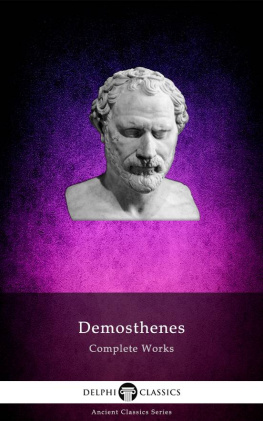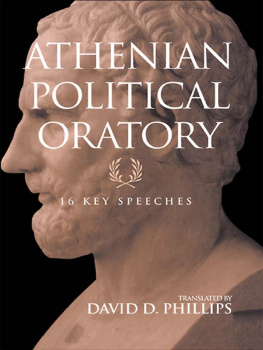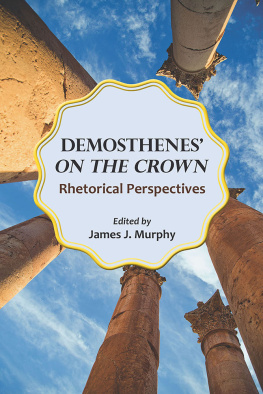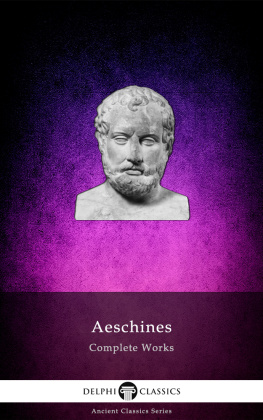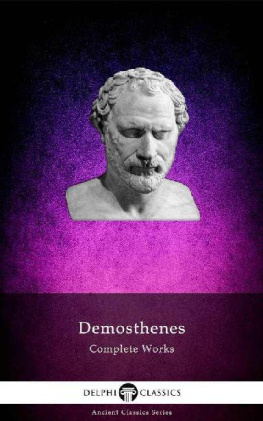Carey Christopher - Demosthenes: selected speeches
Here you can read online Carey Christopher - Demosthenes: selected speeches full text of the book (entire story) in english for free. Download pdf and epub, get meaning, cover and reviews about this ebook. City: New York, year: 2014, publisher: Oxford University Press, genre: Politics. Description of the work, (preface) as well as reviews are available. Best literature library LitArk.com created for fans of good reading and offers a wide selection of genres:
Romance novel
Science fiction
Adventure
Detective
Science
History
Home and family
Prose
Art
Politics
Computer
Non-fiction
Religion
Business
Children
Humor
Choose a favorite category and find really read worthwhile books. Enjoy immersion in the world of imagination, feel the emotions of the characters or learn something new for yourself, make an fascinating discovery.

- Book:Demosthenes: selected speeches
- Author:
- Publisher:Oxford University Press
- Genre:
- Year:2014
- City:New York
- Rating:5 / 5
- Favourites:Add to favourites
- Your mark:
- 100
- 1
- 2
- 3
- 4
- 5
Demosthenes: selected speeches: summary, description and annotation
We offer to read an annotation, description, summary or preface (depends on what the author of the book "Demosthenes: selected speeches" wrote himself). If you haven't found the necessary information about the book — write in the comments, we will try to find it.
Demosthenes: selected speeches — read online for free the complete book (whole text) full work
Below is the text of the book, divided by pages. System saving the place of the last page read, allows you to conveniently read the book "Demosthenes: selected speeches" online for free, without having to search again every time where you left off. Put a bookmark, and you can go to the page where you finished reading at any time.
Font size:
Interval:
Bookmark:
OXFORD WORLDS CLASSICS
SELECTED SPEECHES
DEMOSTHENES of Athens (384322 BC) is widely regarded as the best of the Attic orators, above all for his forcefulness and his professionalism. He was a master of all the available styles, so that he could adapt his writing and delivery to the circumstances of the speech, whether he was delivering it himself or had written it for a client. Demosthenes came from a wealthy family, but his father died young, and the orators first appearances in Athenian public life came with a series of private speeches attempting to recover his inheritance. Having earned a name for himself as a speech-writer, he then wrote speeches for others in both public and private cases, as well as some more for his own use in court cases. But he is best known for his political speeches, written in opposition to the growing power of Macedon in northern Greece, under first Philip II and then his son, Alexander the Great. Demosthenes saw through Philips imperialist machinations and spent his political career trying to warn the Athenians and other southern Greeks about the Macedonian menace. But his opponents were too strong for him, and in the end forced him to suicide. Sixty-one speeches are extant under his name, but the authenticity of about twenty of these is disputed.
ROBIN WATERFIELD is a writer, living in Greece. His previous translations for Oxford Worlds Classics include Platos Republic and five other editions of Platos dialogues, Aristotles Physics, Herodotus Histories, Polybius Histories, Plutarchs Greek Lives and Roman Lives, Euripides Orestes and Other Plays and Heracles and Other Plays, Xenophons The Expedition of Cyrus, and The First Philosophers: The Presocratics and the Sophists.
CHRIS CAREY is Professor of Greek at University College London. He has published on Greek oratory, rhetoric, history, drama, lyric, and law.
OXFORD WORLDS CLASSICS
For over 100 years Oxford Worlds Classics have brought readers closer to the worlds great literature. Now with over 700 titlesfrom the 4,000-year-old myths of Mesopotamia to the twentieth centurys greatest novelsthe series makes available lesser-known as well as celebrated writing.
The pocket-sized hardbacks of the early years contained introductions by Virginia Woolf, T. S. Eliot, Graham Greene, and other literary figures which enriched the experience of reading. Today the series is recognized for its fine scholarship and reliability in texts that span world literature, drama and poetry, religion, philosophy, and politics. Each edition includes perceptive commentary and essential background information to meet the changing needs of readers.
Refer to the to navigate through the material in this Oxford Worlds Classics ebook. Use the asterisks (*) throughout the text to access the hyperlinked Explanatory Notes.
OXFORD WORLDS CLASSICS

DEMOSTHENES

Translated by
ROBIN WATERFIELD
With Introductions and Notes by
CHRIS CAREY


Great Clarendon Street, Oxford, OX2 6DP,
United Kingdom
Oxford University Press is a department of the University of Oxford.
It furthers the Universitys objective of excellence in research, scholarship,
and education by publishing worldwide. Oxford is a registered trade mark of
Oxford University Press in the UK and in certain other countries
Translation Robin Waterfield 2014
Editorial material Chris Carey 2014
First published as an Oxford Worlds Classics paperback 2014
The moral rights of the authors have been asserted
Impression: 1
All rights reserved. No part of this publication may be reproduced, stored in a retrieval system, or transmitted, in any form or by any means, without the prior permission in writing of Oxford University Press, or as expressly permitted by law, by licence or under terms agreed with the appropriate reprographics rights organization. Enquiries concerning reproduction outside the scope of the above should be sent to the Rights Department, Oxford University Press, at the address above
You must not circulate this work in any other form
and you must impose this same condition on any acquirer
Published in the United States of America by Oxford University Press
198 Madison Avenue, New York, NY 10016, United States of America
British Library Cataloguing in Publication Data
Data available
Library of Congress Control Number: 2013948415
ISBN 9780199593774
Printed in Great Britain by
Clays Ltd, St Ives plc
Demosthenes life and times
DEMOSTHENES was born in 384 BC into a wealthy mercantile family. We are unusually well informed about the family wealth because of the litigation which followed the death of his father (also named Demosthenes). The estate (at least according to Demosthenes himself) was worth about 15 talents, in a society where a man with property of 3 talents counted as moderately wealthy. Despite his wealth, his fathers family was undistinguished. His mothers family, however, had a tradition of involvement in politics. Our contemporary source for the mothers family is his enemy Aeschines, Aeschines has Gylon marry a Scythian woman, that is, a member of one of the non-Greek nomadic tribes indigenous to the region. This kind of allegation was part of the rough-and-tumble of Athenian politics (a tough environment by any standards) and the slur cannot be literally true, since Demosthenes never faced a serious challenge to his citizen status. The allegation could be plucked out of the air; the distance from Athens to the Black Sea made it impossible in practice to test the claim and Athenian slander laws were sufficiently permissive to make the claim risk-free even if false. Or it may mean no more than that Gylons wife was of non-Athenian colonial Greek stock. From the middle of the fifth century a man needed two Athenian parents in order to be a citizen himself; but this law seems to have fallen into abeyance during the latter part of the Peloponnesian War (431404). Though it was reinstated after the restoration of democracy in 403, this was not retroactive, and provided that Demosthenes mother was born before 403 his citizen status would be unaffected.
Demosthenes first opportunity to put his training to the test came early. His father had died while Demosthenes was still a boy. Though his mother was still alive, he was in Athenian terms an orphanos and his fathers estate was managed by guardians appointed by his father in his will. The will arranged for the management of the property and also (in a manner not uncommon in Athens) for the marriage of his widow and his daughter, Demosthenes sister. Neither marriage eventually took place, and when on coming of age Demosthenes received the accounts from his three guardians for the management of the estate, the amount remaining was sufficiently low to convince him that he had been defrauded. This began a series of successful legal disputes with his guardians.
It may be at this time that he began work on training his voice. There were, of course, no microphones and the large numbers to be addressed either in the courts or in the Assembly placed a considerable demand on voice and breathing. According to a later biographer Demosthenes had a weak voice and a lisp. To overcome both he practised speaking with pebbles in his mouth, running or walking uphill. Ancient biographical traditions are rich in myth and one can never be quite sure of the reliability of statements they make; but this one has some claim to credibility, since it came from Demetrius of Phalerum,
Font size:
Interval:
Bookmark:
Similar books «Demosthenes: selected speeches»
Look at similar books to Demosthenes: selected speeches. We have selected literature similar in name and meaning in the hope of providing readers with more options to find new, interesting, not yet read works.
Discussion, reviews of the book Demosthenes: selected speeches and just readers' own opinions. Leave your comments, write what you think about the work, its meaning or the main characters. Specify what exactly you liked and what you didn't like, and why you think so.

